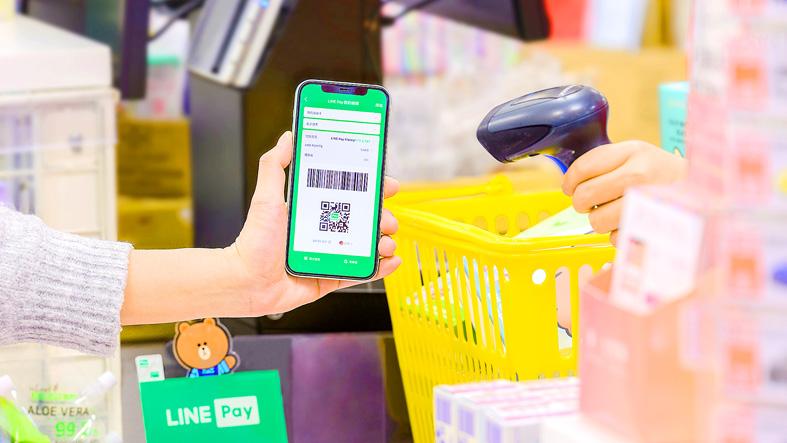There were 7.28 million digital savings accounts in Taiwan as of the end of March, up 12.7 percent from a quarter earlier, Financial Supervisory Commission data showed on Tuesday.
Taishin International Bank (台新銀行) retained top spot with 2.49 million accounts for its Richart online service, up 5.5 percent from 2.36 million at the end of last year, the data showed.
Cathay United Bank (國泰世華銀行) was second with 1.12 million accounts, up 15.8 percent from a quarter earlier, the data showed.

Photo courtesy of Line Pay
Bank SinoPac (永豐銀行) was third with 791,000 accounts, up 19 percent from three months earlier, while First Commercial Bank (第一銀行) was fourth with 550,000 accounts, but had the steepest gain of 22 percent quarter-on-quarter.
O-Bank (王道商業銀行), which was third in the third quarter last year with 447,000 accounts, fell to fifth last quarter with 457,000 accounts, rising only 1.1 percent quarter-on-quarter.
The quick overall rise in accounts might be due to more banks launching such services and offering better interest rates to cultivate a customer base that favors online services over visiting brick-and-mortar branches.
Most banks offer interest rates of more than 1 percent on digital savings accounts, compared with interest rates for demand deposit accounts at physical banks of 0.1 to 0.2 percent.
First Commercial Bank’s interest rate for its digital saving accounts is 1.2 percent, the same as Taishin International Bank, the data showed.
Rakuten International Commercial Bank Co (樂天國際商銀), Taiwan’s first Web-only bank, which started business in January, reported 36,000 accounts, while Line Bank Taiwan Ltd (連線商業銀行), which launched on Thursday last week, reported 42,974 accounts as of Tuesday, the commission said.

HANDOVER POLICY: Approving the probe means that the new US administration of Donald Trump is likely to have the option to impose trade restrictions on China US President Joe Biden’s administration is set to initiate a trade investigation into Chinese semiconductors in the coming days as part of a push to reduce reliance on a technology that US officials believe poses national security risks. The probe could result in tariffs or other measures to restrict imports on older-model semiconductors and the products containing them, including medical devices, vehicles, smartphones and weaponry, people familiar with the matter said. The investigation examining so-called foundational chips could take months to conclude, meaning that any reaction to the findings would be left to the discretion of US president-elect Donald Trump’s incoming team. Biden

Intel Corp chief financial officer Dave Zinsner said that a formal separation of the company’s factory and product development divisions is an open question that would be decided by the chipmaker’s next leader. Zinsner, who is serving as interim co-CEO following this month’s ouster of Pat Gelsinger, made the remarks on Thursday at the Barclays technology conference in San Francisco alongside co-CEO Michelle Johnston Holthaus. Intel’s struggles to keep pace with rivals — along with its deteriorating financial condition — have spurred speculation that the next CEO would make dramatic changes. That has included talk of a split of the company’s manufacturing

HOUSING: The uptick to 2.24 percent came despite the central bank leaving its policy unchanged for two quarters and raising lenders’ required reserve ratios Mortgage interest rates last quarter spiked to a 15-year high of 2.23 percent despite a decline in loan applications, as local lenders slowed real-estate lending to support the central bank’s credit controls, Taiwan Realty Co (台灣房屋) said yesterday. “The data suggests that buying a home is growing increasingly difficult,” the brokers said, citing data from the Joint Credit Information Center (聯徵中心). The uptick in mortgage burdens came even though the central bank left its policy rates unchanged in the past two quarters and hiked the lenders’ required reserve ratios to drain money from the market, head researcher Charlene Chang (張旭嵐) said. Further, the

In a patch of South America rich in lithium, used to make batteries for electric cars and other tech, Bolivia is lagging its neighbors in the race to mine the key metal. An area called the “lithium triangle” which spills over the borders of Bolivia, Chile and Argentina is home to 60 percent of the world’s lithium reserves, according to the US Geological Survey. Bolivia claims to have Earth’s largest deposit of the metal, used to make rechargeable batteries for smartphones, laptops and other devices besides e-vehicles. However, Bolivia has undertaken only four pilot projects and is running just one